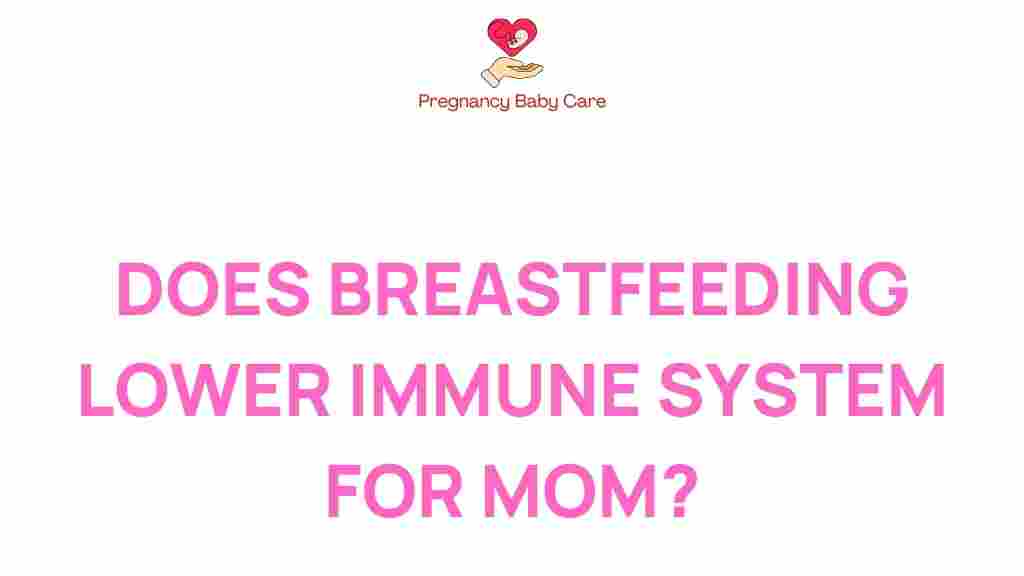Does Breastfeeding Compromise a Mother’s Immune System?
Breastfeeding is often heralded as the gold standard for infant nutrition, providing numerous health benefits for both mothers and their newborns. However, a common concern among new mothers is whether breastfeeding may compromise their immune system. This article delves into the relationship between breastfeeding and maternal health, exploring how lactation affects a mother’s immunity and overall wellbeing.
Understanding the Immune System During Lactation
The immune system is the body’s defense against infections and diseases. It comprises various cells, tissues, and organs that work together to protect the body. During pregnancy and lactation, a woman’s body undergoes significant changes, including alterations in the immune system.
During breastfeeding, mothers produce antibodies that are passed to their infants through breast milk. This transfer is crucial for enhancing the newborn’s immunity. However, many mothers worry about the potential impact of breastfeeding on their own immune health. Let’s explore this further.
The Benefits of Breastfeeding for Maternal and Infant Health
Breastfeeding provides a myriad of benefits for both mothers and infants, including:
- Enhanced Infant Immunity: Breast milk contains antibodies, particularly immunoglobulin A (IgA), which help protect the infant from infections.
- Reduced Risk of Chronic Conditions: Studies suggest that breastfeeding is linked to lower risks of obesity, diabetes, and certain cancers in mothers.
- Emotional and Psychological Benefits: The bonding experience during breastfeeding promotes maternal well-being.
- Cost-Effective: Breastfeeding reduces healthcare costs associated with infant illnesses.
Does Breastfeeding Weaken a Mother’s Immune System?
Research indicates that breastfeeding does not significantly weaken a mother’s immune system. In fact, it may enhance it in several ways:
- Boosted Immune Response: The act of breastfeeding stimulates the release of hormones such as oxytocin, which can enhance maternal immune function.
- Reduced Inflammation: Breastfeeding is associated with lower levels of inflammatory markers in mothers, contributing to better overall health.
- Improved Recovery: Mothers who breastfeed may recover more quickly from childbirth due to the physiological benefits of lactation.
However, it is important to note that while breastfeeding supports maternal health, it can also present certain challenges that may temporarily affect a mother’s immune system.
Health Risks and Challenges of Breastfeeding
While breastfeeding is beneficial, some health risks and challenges can arise, including:
- Increased Nutritional Demand: Lactating mothers require more calories and nutrients. Inadequate nutrition can compromise their immune system.
- Fatigue and Stress: Caring for a newborn can lead to exhaustion, which may weaken the immune response.
- Potential for Infections: Breastfeeding mothers can still contract infections, which can affect their health and breastfeeding practices.
- Dehydration: Adequate hydration is essential for milk production. Dehydration can impact maternal health.
Step-by-Step Guide to Maintaining Maternal Health During Breastfeeding
To ensure that breastfeeding does not compromise a mother’s immune system, it’s essential to focus on maternal health. Here’s a step-by-step guide:
1. Prioritize Nutrition
Mothers should consume a balanced diet rich in:
- Fruits and vegetables
- Whole grains
- Lean proteins
- Dairy or dairy alternatives
2. Stay Hydrated
Drink plenty of fluids, as hydration is crucial for milk production and overall health. Aim for at least 8-10 glasses of water daily.
3. Manage Stress
Engage in relaxation techniques such as yoga, meditation, or deep-breathing exercises to reduce stress levels, which can impact immunity.
4. Get Enough Rest
Sleep is vital for recovery and immune function. Try to rest when the baby sleeps and enlist help from family or friends.
5. Regular Health Check-Ups
Regular visits to healthcare providers can help monitor maternal health and address any potential issues early.
6. Seek Support
Join breastfeeding support groups or consult lactation consultants for guidance and encouragement.
Troubleshooting Common Breastfeeding Challenges
Despite the benefits, many mothers encounter challenges while breastfeeding. Here are some common issues and solutions:
1. Low Milk Supply
If a mother is concerned about low milk supply, she can:
- Ensure proper latching techniques
- Breastfeed frequently to stimulate milk production
- Consider lactation supplements or herbal remedies after consulting a healthcare provider
2. Painful Nursing or Cracked Nipples
To alleviate discomfort, consider:
- Using lanolin cream or nipple shields
- Ensuring a proper latch
- Taking breaks between feedings to allow healing
3. Maternal Illness
If a breastfeeding mother becomes ill:
- Consult a healthcare provider about safe medications
- Continue breastfeeding if possible, as it helps pass antibodies to the infant
- Focus on self-care and recovery
Conclusion: Embracing the Benefits of Breastfeeding
In conclusion, breastfeeding is a powerful tool for enhancing both maternal and infant health. Contrary to the fear that breastfeeding may compromise a mother’s immune system, evidence suggests that it can actually support maternal immunity and overall wellbeing. By prioritizing nutrition, hydration, rest, and stress management, mothers can maintain their health while providing essential nutrients and antibodies to their newborns.
For more information on breastfeeding and maternal wellbeing, visit this resource. It’s important for mothers to seek support and stay informed about their health during this critical time. Embrace the journey of breastfeeding and its myriad of benefits for both you and your baby!
For further reading on the impact of breastfeeding on both mothers and infants, check out this external article.
This article is in the category Health and created by PregnancyBabyCare Team
